Edie Melson's Blog, page 224
October 1, 2019
The Art of Writing Action

by Sarah Sally Hamer @SarahSallyHamer
Characters do more than just talk at each other. They move—with grace, in anger, to disguise emotion—and movement tells even more about them than their words. Understanding and using action to tell a story is both powerful and organic—a naturally evolving way to strong characterization.What is body language? Google it on the web—you’ll find dozens of books by experts from all sides: psychology, business, spiritual growth, forensic investigations, and many, many more, all useful in their own way.
Each expert ultimately says the same thing.
Humans have a universal language. And, if an author can capture that physical reaction in words, there is an instantaneous and, often, unconscious connection formed with the reader.
Wow! What better way to reel your reader in? Showing a reader what your character is feeling simply by the way he stands or she smiles is mega-powerful! But it’s not just about a lip curling or an eyebrow lifting or eyes narrowing. In fact, more than one writer doesn’t understand just how potent a well-executed “message cluster”, or multiple body language signals, can be.
Let’s take a character - a female private eye who is strong-willed, brave to the point of foolhardiness, and angry at men. But let’s also give her a vulnerability: her mother died when she was young and she feels guilty because children often do.
So, what do you think she would look like? Exhibit as body language?
I can see her wearing a short, tight skirt and red and black cowboy boots and an attitude a mile long. Let’s give her long purple-painted fingernails that she taps on her phone as she waits for a late client.
Her legs are crossed, barely covering the essentials, and her drawn-on eyebrows are getting lower and closer together as she waits.
A woman and small child walk by and the mother stops long enough to tie her daughter’s shoelace. Our character averts her head, not willing to watch the tenderness with which the mother smiles at her child.
It hurts too badly and she doesn’t know how to handle it.
This character is acting in the manner a woman in her position with her background would. She is going to be hard-shelled and difficult with easily-pushed buttons. And her body will show this with every movement she makes. The reader will identify with this character, based on the messages her body gives them.
Contrast this type of character with a preacher’s wife. Chances are that she’ll be soft-spoken and well-mannered with her emotions hidden behind a sometimes forced smile. Maybe she would wear a dark-colored dress, buttoned to the neck, with a small white collar. A black sweater allows her to hide any vulnerabilities she has. Her shoes are non-descript flats that she will place with care as she walks, as if on eggshells.
Her daughter has just defiantly blurted out that she’s pregnant, so our character drops into a chair and wraps her sweater around her body to protect her core, slipping off her shoes to tuck her feet up under her dress. Do you see the fetal position - one that shields her from things she doesn’t want to think about?
But, when she’s defending her daughter, she’ll put her feet solidly on the ground and pull her sleeves up past her elbows, baring her arms for the coming fight. Her voice, earlier trembling and weak, will take on power and strength for the length of the adrenaline rush. But all too soon, at least until a character arc changes the situation, she’ll retreat back into the wifely role – the sleeves will once again cover her arms, her voice will become soft again and she’ll slip back into the character she needs to be.
The combination and contrast of the body language clusters helps our readers to see these characters as real people, with real emotions. Incorporating a few here and another couple there, especially in a large, important scene, can make all the difference!
I’ve just mentioned a few emotions— there are many, many places to find more and I encourage you to look for ways to portray them. Post some of your body language examples!
TWEETABLEThe Art of Writing Action - @SarahSallyHamer on @EdieMelson (Click to Tweet)
 Sarah (Sally) Hamer is a lover of books, a teacher of writers, and a believer in a good story. Most of all, she is eternally fascinated by people and how they 'tick'. She’s passionate about helping people tell their own stories, whether through fiction or through memoir. Writing in many genres - mystery, science fiction, fantasy, romance, medieval history, non-fiction – she has won awards at both local and national levels, including two Golden Heart finals.
Sarah (Sally) Hamer is a lover of books, a teacher of writers, and a believer in a good story. Most of all, she is eternally fascinated by people and how they 'tick'. She’s passionate about helping people tell their own stories, whether through fiction or through memoir. Writing in many genres - mystery, science fiction, fantasy, romance, medieval history, non-fiction – she has won awards at both local and national levels, including two Golden Heart finals.A teacher of memoir, beginning and advanced creative fiction writing, and screenwriting at Louisiana State University in Shreveport for over sixteen years, she also teaches online for Margie Lawson at www.margielawson.com. Sally is a free-lance editor and book coach at Touch Not the Cat Books, with many of her students and clients becoming successful, award-winning authors.
You can find her at hamerse@bellsouth.netor www.sallyhamer.blogspot.com
I wish to express gratitude to the giants whose shoulders I stand on and who taught me so much about the writing craft. I would list every one, if it were only possible.
Published on October 01, 2019 22:00
September 30, 2019
For Writers: What to Remember, What to Forget

by PeggySue Wells @PeggySueWells
Multi-published author and ghostwriter of more than 100 titles, Cecil (Cec) Murphey tells how his missionary experience impacts his writing.
A decade after I left Kenya, East Africa, I returned and met with a group of pastors whom I had taught. I preached twice that day, both in churches I helped to start. Afterward, ten of us gathered in the home of Blasio Were, one of the pastors. Because he was the only one who didn’t know fluent English, we spoke in Luo, the local language.I turned to Erastus. “I would never have learned the language without your help.”
“I did little.” He shrugged shyly. “A lesson or two only.”
“You did more than that.” In those days, Erastus had taught in an elementary school twelve miles away. After classes, he rode his bicycle to my house. Most afternoons, he spent at least an hour teaching me.
“If you say so,” he said, “but I do not remember.”
How could he not remember? He not only had taught me the syntax and vocabulary, but he demanded that I learn to pronounce the words exactly right. One day it had taken him almost an hour to teach me a particularly difficult guttural diphthong.
Nathaniel Jullu said, “Do you remember the financial problems I had after I left teaching to start a church? The offerings were small, and I borrowed money from you.”
I shook my head.
“When I could not repay, you canceled my debt. I shall always remember. How is it that you have forgotten?”
One by one, the others told stories of help I had given during times when they faced serious troubles. At most, I retained blurred memories.
As daylight vanished, Blasio hung a German-made kerosene-operated pressure lamp.
“Neh (look).” He pointed at the lamp.
I commented that it was a nice lamp and returned to the conversation with the others. I reminded another pastor of the time he traveled 150 miles by bus to buy a part for my motorcycle so I could stay and teach.
“Did I do that?” He shrugged as if it were nothing.
Blasio pointed to the pressure lamp again. “Neh! Mano ber? (Look, isn’t it nice?)”
“It’s nice,” I said.
“Can you not see?” He touched the lamp fondly. “It is the one you gave me. Do you not remember?”
I shook my head.
Blasio threw an arm around my shoulder. “You have done acts of kindness for my brothers and do not remember. They have done acts of kindness that they have forgotten. They remember what you have done. You remember what they have done. Ah, this is the way God teaches us, is it not?”
I still didn’t understand.
The barely educated man leaned closer. “Those who give must never remember. Those who receive must never forget. Is that not the way of God?”
Those simple words changed my life. Although not given as advice, it was a lesson I never wanted to forget.
And I still remember.
TWEETABLEFor Writers: What to Remember, What to Forget - @PeggySueWells on @EdieMelson (Click to Tweet)
 Tropical island votary and history buff, PeggySue Wells parasails, skydives, snorkels, scuba dives, and has taken (but not passed) pilot training. Writing from the 100-Acre wood in Indiana, Wells is the bestselling author of twenty-eight books including The Slave Across the Street, Slavery in the Land of the Free, Bonding With Your Child Through Boundaries, Homeless for the Holidays, and Chasing Sunrise. Optimistic dream-driver, PeggySue is named for the Buddy Holly song with the great drumbeat. At school author visits, she teaches students the secrets to writing, and speaks at events and conferences. Connect with her at www.PeggySueWells.com, on Facebook at PeggySue Wells, and Twitter @PeggySueWells.
Tropical island votary and history buff, PeggySue Wells parasails, skydives, snorkels, scuba dives, and has taken (but not passed) pilot training. Writing from the 100-Acre wood in Indiana, Wells is the bestselling author of twenty-eight books including The Slave Across the Street, Slavery in the Land of the Free, Bonding With Your Child Through Boundaries, Homeless for the Holidays, and Chasing Sunrise. Optimistic dream-driver, PeggySue is named for the Buddy Holly song with the great drumbeat. At school author visits, she teaches students the secrets to writing, and speaks at events and conferences. Connect with her at www.PeggySueWells.com, on Facebook at PeggySue Wells, and Twitter @PeggySueWells.
Published on September 30, 2019 22:00
September 29, 2019
Theme—The Abstract Element of Novel Writing
Edie here. Today I'm excited to introduce our newest columnist, Kathleen Neely. I've known this talented author for several years and so glad she'll be blogging regularly here on The Write Conversation. Be sure to give her a warm welcome!

Theme—The Abstract Element of Novel Writing
by Kathleen Neely @NeelyKneely3628
A writer makes many decisions when beginning a new novel. Characters. Structuring a plot. POVs. First or third person. Past or present tense.
However, theme, perhaps the most important element, is often neglected. What is theme and why is it important? I want to share this because I knew nothing about literary theme when I began writing. I’ve learned that thematic writing will improve a novel. I like to think of it this way. When I hear a message in church or an academic lecture, there is always a take-away. What’s the big picture component, the glue that holds all other pieces together? That’s the theme. It’s the reason behind the story. It’s typically subtle, understated, yet consistent.
If a writer fails to identify a theme, one of two things may occur:
A theme may emerge of its own accord. Perhaps the author didn’t consciously identify the big picture idea, but it developed naturally. Frankly, that’s the way I began writing. A plot idea, when structured, created a theme. The problem with that approach is the missed opportunities to deepen the impact of the novel. For example, The Least of These has three characters who are homeless. Since it was published, I’ve had numerous comments about its impact on the awareness of homelessness. Thinking back, I see lost opportunities to expand that. My attention to plot over theme actually hindered the development of what may have become a better plot.
The other result of failure to identify a theme is worse. It can render a novel as superficial entertainment, the kind that you read then promptly forget. There’s no real take-away. No lasting impact. No big picture.’ For me, the best novels are those that I think about long after closing the final page. They hold the “why” element of a plot.
So, how do we write with attention to theme? I mentioned subtlety and consistency. Let’s talk about subtlety. I have a friend who is a Christian with strong faith. She lives it, shares it, and spreads the love of Christ by her lifestyle. She’s an avid reader who told me she doesn’t like Christian fiction. Why? Because the theme is too often overtly stated with a strong hand. It feels forced and becomes a detriment to plot. I love Christian fiction when it’s done well with a gently woven message, authentic to the characters and plot. Readers really don’t want you to preach at them through the guise of a novel.
Despite the subtlety of the theme, that big picture still needs consistency. Failure to recognize the theme may result in a character acting in a contrary manner, thus weakening the take-away. If theme is identified from the start of a novel, that’s less likely to occur.
If you read Beauty for Ashes, you should easily identify the theme of unresolved guilt. It crippled Nathan despite his attempts to deny it. His fear of imprisonment has imprisoned him in a different manner.
Choosing a theme doesn’t have to be difficult. It can be broad or narrowed down. Consider these comprehensive possibilities and how they might be refined: Love / HateGood vs. EvilGuilt ForgivenessJusticePrejudiceSurvival Rich vs. PoorIdentity / Coming of AgePower
So, before you choose the names of your characters and the setting of a novel, ask yourself a question. What’s the big idea, the take-away, the ‘why’ of this novel? What do I want readers to remember long after they read the final page?
I’d love to hear what book you’ve read that had a lasting impact. If you’re remembering it today, I guarantee you the author gave attention to theme.
TWEETABLETheme—The Abstract Element of Novel Writing - tips from @NeelyKneely3628 on @EdieMelson (Click to Tweet)
 Kathleen Neely has been a teacher, a principal, and an award-winning author. She currently has three novels available through Harbourlight, an imprint of Pelican Book Group, and numerous devotions on ChristianDevotions.us. She is a member of Association of Christian Fiction Writers. She and her husband reside in South Carolina. When she’s not writing, she travels frequently to Pennsylvania, Florida, and any Carolina beach to spend time with family. You can connect with her on her website at www.KathleenNeely.com.
Kathleen Neely has been a teacher, a principal, and an award-winning author. She currently has three novels available through Harbourlight, an imprint of Pelican Book Group, and numerous devotions on ChristianDevotions.us. She is a member of Association of Christian Fiction Writers. She and her husband reside in South Carolina. When she’s not writing, she travels frequently to Pennsylvania, Florida, and any Carolina beach to spend time with family. You can connect with her on her website at www.KathleenNeely.com.

Theme—The Abstract Element of Novel Writing
by Kathleen Neely @NeelyKneely3628
A writer makes many decisions when beginning a new novel. Characters. Structuring a plot. POVs. First or third person. Past or present tense.
However, theme, perhaps the most important element, is often neglected. What is theme and why is it important? I want to share this because I knew nothing about literary theme when I began writing. I’ve learned that thematic writing will improve a novel. I like to think of it this way. When I hear a message in church or an academic lecture, there is always a take-away. What’s the big picture component, the glue that holds all other pieces together? That’s the theme. It’s the reason behind the story. It’s typically subtle, understated, yet consistent.
If a writer fails to identify a theme, one of two things may occur:
A theme may emerge of its own accord. Perhaps the author didn’t consciously identify the big picture idea, but it developed naturally. Frankly, that’s the way I began writing. A plot idea, when structured, created a theme. The problem with that approach is the missed opportunities to deepen the impact of the novel. For example, The Least of These has three characters who are homeless. Since it was published, I’ve had numerous comments about its impact on the awareness of homelessness. Thinking back, I see lost opportunities to expand that. My attention to plot over theme actually hindered the development of what may have become a better plot.
The other result of failure to identify a theme is worse. It can render a novel as superficial entertainment, the kind that you read then promptly forget. There’s no real take-away. No lasting impact. No big picture.’ For me, the best novels are those that I think about long after closing the final page. They hold the “why” element of a plot.
So, how do we write with attention to theme? I mentioned subtlety and consistency. Let’s talk about subtlety. I have a friend who is a Christian with strong faith. She lives it, shares it, and spreads the love of Christ by her lifestyle. She’s an avid reader who told me she doesn’t like Christian fiction. Why? Because the theme is too often overtly stated with a strong hand. It feels forced and becomes a detriment to plot. I love Christian fiction when it’s done well with a gently woven message, authentic to the characters and plot. Readers really don’t want you to preach at them through the guise of a novel.
Despite the subtlety of the theme, that big picture still needs consistency. Failure to recognize the theme may result in a character acting in a contrary manner, thus weakening the take-away. If theme is identified from the start of a novel, that’s less likely to occur.
If you read Beauty for Ashes, you should easily identify the theme of unresolved guilt. It crippled Nathan despite his attempts to deny it. His fear of imprisonment has imprisoned him in a different manner.
Choosing a theme doesn’t have to be difficult. It can be broad or narrowed down. Consider these comprehensive possibilities and how they might be refined: Love / HateGood vs. EvilGuilt ForgivenessJusticePrejudiceSurvival Rich vs. PoorIdentity / Coming of AgePower
So, before you choose the names of your characters and the setting of a novel, ask yourself a question. What’s the big idea, the take-away, the ‘why’ of this novel? What do I want readers to remember long after they read the final page?
I’d love to hear what book you’ve read that had a lasting impact. If you’re remembering it today, I guarantee you the author gave attention to theme.
TWEETABLETheme—The Abstract Element of Novel Writing - tips from @NeelyKneely3628 on @EdieMelson (Click to Tweet)
 Kathleen Neely has been a teacher, a principal, and an award-winning author. She currently has three novels available through Harbourlight, an imprint of Pelican Book Group, and numerous devotions on ChristianDevotions.us. She is a member of Association of Christian Fiction Writers. She and her husband reside in South Carolina. When she’s not writing, she travels frequently to Pennsylvania, Florida, and any Carolina beach to spend time with family. You can connect with her on her website at www.KathleenNeely.com.
Kathleen Neely has been a teacher, a principal, and an award-winning author. She currently has three novels available through Harbourlight, an imprint of Pelican Book Group, and numerous devotions on ChristianDevotions.us. She is a member of Association of Christian Fiction Writers. She and her husband reside in South Carolina. When she’s not writing, she travels frequently to Pennsylvania, Florida, and any Carolina beach to spend time with family. You can connect with her on her website at www.KathleenNeely.com.
Published on September 29, 2019 22:00
September 28, 2019
Don't Let Your Writing Get Caught in a Crab Bucket
Edie here. Back in 2010 I met a writer and really loved her spiritual insight and her writing style. I invited her to contribute a guest post to The Write Conversation. She did and then we eventually lost connection. This summer we ran into each other again. She'd taken some time off from writing, but now was back at the keyboard. Today I'd like to re-introduce Susan Browning Schulz. I know you're going to love her post today!
 Don't Let Your Writing Get Caught in a Crab Bucket
Don't Let Your Writing Get Caught in a Crab Bucket
Susan Browning Schulz
Crab fishermen have long known they don’t need to put a lid on their buckets, as long as there is more than one crab in the bucket. Some call it the Crab Bucket Syndrome. When there are several piled in the bucket, if one tries to crawl out, another one grabs hold and pulls it back down. Some of us desire to climb above, raise our standards and improve ourselves, but Satan, and those who belong to him, act like crabs in a bucket. They do everything in their power to destroy the ambitions of those who wish to better themselves. These snatch and seize techniques work among us humans, too. Our own thoughts can catch us and put us in a bucket, causing us to suffer from the Crab Bucket Syndrome.
What is holding you back from improving your writing? These pulls and pinches come in thoughts like:I don’t have time to sit down and write something for critique group.Do I really need someone else’s input?It’s too much work to edit using all of those different comments and suggestions.I will never find a place for my articles and stories, anyway.
Writers write—no matter how they feel. Don’t let these crabby, negative thoughts keep you in a bucket of mediocrity. Work on raising the standards of your writing every day, starting right now. One of the best ways to develop good skills is to attend conferences. Find one and sign up today. Hope to see you there!
Don't forget to join the conversation!Blessings,Susan
TWEETABLEDon't Let Your Writing Get Caught in a Crab Bucket - Susan Browning Schulz on @EdieMelson (Click to Tweet)
 Susan Browning Schulz is a writer, mentor, wife and mom. A passionate ministry leader for over 28 years, she mentors women and has led conferences across the southeast. Susan stays inspired chasing world changers by writing monthly nonprofit features for Around About Local Media (Around Canton, Around Woodstock, Around Acworth, and the Townelaker). She is a regular contributor for Light from the Word devotional, and has publishing credits in numerous anthologies, such as a Guideposts series on Extraordinary Answers to Prayer, as well as many online and print articles. She loves God’s word and spent 13 years attending and leading in Bible Study Fellowship International. An empty-nester, Susan lives with her artist husband who spins a potter’s wheel in Canton, Georgia. Reach out to her at: susanbrowningschulz.com, Instagram.com/susanbrowningschulz, facebook.com/susanbrowningschulz
Susan Browning Schulz is a writer, mentor, wife and mom. A passionate ministry leader for over 28 years, she mentors women and has led conferences across the southeast. Susan stays inspired chasing world changers by writing monthly nonprofit features for Around About Local Media (Around Canton, Around Woodstock, Around Acworth, and the Townelaker). She is a regular contributor for Light from the Word devotional, and has publishing credits in numerous anthologies, such as a Guideposts series on Extraordinary Answers to Prayer, as well as many online and print articles. She loves God’s word and spent 13 years attending and leading in Bible Study Fellowship International. An empty-nester, Susan lives with her artist husband who spins a potter’s wheel in Canton, Georgia. Reach out to her at: susanbrowningschulz.com, Instagram.com/susanbrowningschulz, facebook.com/susanbrowningschulz
 Don't Let Your Writing Get Caught in a Crab Bucket
Don't Let Your Writing Get Caught in a Crab BucketSusan Browning Schulz
Crab fishermen have long known they don’t need to put a lid on their buckets, as long as there is more than one crab in the bucket. Some call it the Crab Bucket Syndrome. When there are several piled in the bucket, if one tries to crawl out, another one grabs hold and pulls it back down. Some of us desire to climb above, raise our standards and improve ourselves, but Satan, and those who belong to him, act like crabs in a bucket. They do everything in their power to destroy the ambitions of those who wish to better themselves. These snatch and seize techniques work among us humans, too. Our own thoughts can catch us and put us in a bucket, causing us to suffer from the Crab Bucket Syndrome.
What is holding you back from improving your writing? These pulls and pinches come in thoughts like:I don’t have time to sit down and write something for critique group.Do I really need someone else’s input?It’s too much work to edit using all of those different comments and suggestions.I will never find a place for my articles and stories, anyway.
Writers write—no matter how they feel. Don’t let these crabby, negative thoughts keep you in a bucket of mediocrity. Work on raising the standards of your writing every day, starting right now. One of the best ways to develop good skills is to attend conferences. Find one and sign up today. Hope to see you there!
Don't forget to join the conversation!Blessings,Susan
TWEETABLEDon't Let Your Writing Get Caught in a Crab Bucket - Susan Browning Schulz on @EdieMelson (Click to Tweet)
 Susan Browning Schulz is a writer, mentor, wife and mom. A passionate ministry leader for over 28 years, she mentors women and has led conferences across the southeast. Susan stays inspired chasing world changers by writing monthly nonprofit features for Around About Local Media (Around Canton, Around Woodstock, Around Acworth, and the Townelaker). She is a regular contributor for Light from the Word devotional, and has publishing credits in numerous anthologies, such as a Guideposts series on Extraordinary Answers to Prayer, as well as many online and print articles. She loves God’s word and spent 13 years attending and leading in Bible Study Fellowship International. An empty-nester, Susan lives with her artist husband who spins a potter’s wheel in Canton, Georgia. Reach out to her at: susanbrowningschulz.com, Instagram.com/susanbrowningschulz, facebook.com/susanbrowningschulz
Susan Browning Schulz is a writer, mentor, wife and mom. A passionate ministry leader for over 28 years, she mentors women and has led conferences across the southeast. Susan stays inspired chasing world changers by writing monthly nonprofit features for Around About Local Media (Around Canton, Around Woodstock, Around Acworth, and the Townelaker). She is a regular contributor for Light from the Word devotional, and has publishing credits in numerous anthologies, such as a Guideposts series on Extraordinary Answers to Prayer, as well as many online and print articles. She loves God’s word and spent 13 years attending and leading in Bible Study Fellowship International. An empty-nester, Susan lives with her artist husband who spins a potter’s wheel in Canton, Georgia. Reach out to her at: susanbrowningschulz.com, Instagram.com/susanbrowningschulz, facebook.com/susanbrowningschulz
Published on September 28, 2019 22:00
September 27, 2019
Showing up as a Writer
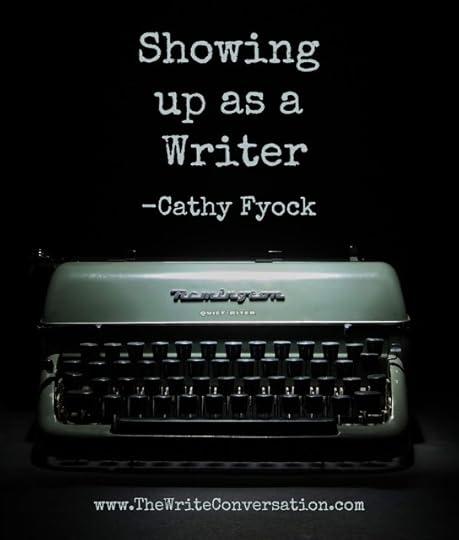
by Cathy Fyock @CathyFyock
80% of success in life is showing up. –Woody Allen
I love this Woody Allen quote, and I’ve been thinking about how we as authors “show up.”
I believe that these statements are those that are made by authors who are not only showing up, but making real progress with their work. How many of these are messages with which you identify?
I block time on my calendar to write, and I honor that time commitment.
When I can’t honor a calendar appointment to write, I reschedule that appointment.
I have a word count goal or writing time goal each day or week.
I keep my topic “top of mind” so that I’m always collecting stories, examples, and ideas for my book.
I wear my “Ask me about my book” button and regularly engage in conversations with others about my book’s topic.
I have “author of the forthcoming book” on my email signature.
I conduct regular research on my topic; I have Google alerts set for my topics.
I carry my books with me so that I can offer then for sale when someone asks. I always have one in my tote bag or briefcase, and I carry a box in my car!
I have my book’s positioning statement—my 30 second commercial for my book—ready to go and can share it with others without hesitation.
I’m always looking for news hooks that themes that relate to my book’s topic so that I can write relevant blogs or pitch my story to the news media.
I regularly write blog content on my topic.
I am obsessed with my topic!
So, are you “showing up” as an author? How can you up your game and show up as the authority that you are?
TWEETABLE
Showing up as a writer - tips from @CathyFyock on @EdieMelson (Click to Tweet)
 Cathy Fyock is The Business Book Strategist, and works with professionals and thought leaders who want to write as a business development strategy. She is the author of nine books, including her most recent with coauthor Lois Creamer, The Speaker Author: Sell More Books and Book More Speeches. Since starting her business in 2014 she's helped more than 150 professionals become published authors. You can reach her at Cathy@CathyFyock.com.
Cathy Fyock is The Business Book Strategist, and works with professionals and thought leaders who want to write as a business development strategy. She is the author of nine books, including her most recent with coauthor Lois Creamer, The Speaker Author: Sell More Books and Book More Speeches. Since starting her business in 2014 she's helped more than 150 professionals become published authors. You can reach her at Cathy@CathyFyock.com.
Published on September 27, 2019 22:00
September 26, 2019
An Unlikely Publishing Story – Hope for When You Feel Like Quitting
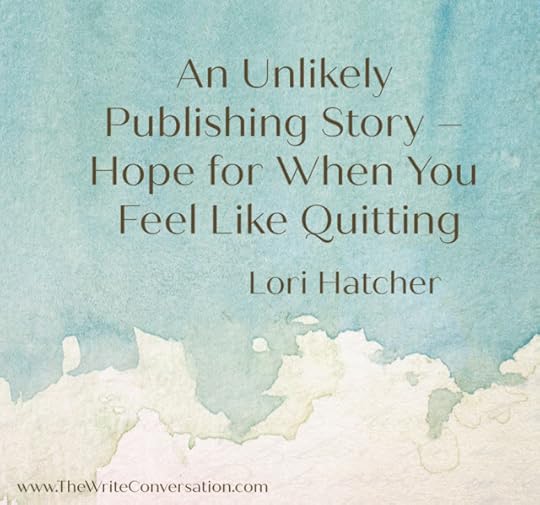
by Lori Hatcher @LoriHatcher2
Jerry loves God and those around him. He ministers through his local assembly, studies the Bible, and counsels his friends and neighbors. Concerned about the direction in which his country is moving, he’s become increasingly fervent in his witnessing.One day, God calls him to write a book. A bold book. A passionate book. A politically-incorrect book.
Jerry’s been following the Lord since he was 13 years old, so he knows disobedience isn’t an option. Who knows? Maybe God will use his book to turn the tide of culture and faith and set the nation back on track.
Regardless of the outcome, God has called him to write the book, so write the book he will.
Knowing he needs help, Jerry enlists Barry, his partner and friend. Among other abilities, Barry can type, so Jerry dictates, and Barry transcribes.
When they finish the manuscript, they send off the only copy to Jerry’s agent. “When the time is right,” the agent says, “I’ll present it to an acquisitions editor.”
So they wait. And wait. And wait. A year passes before Jerry receives a message: It’s time.
Within hours, he receives another message: The editor was blown away. He’s calling a special meeting of the pub board.
In the pub board, the editor reads a few sample chapters aloud. When he’s finished, the room is silent—until everyone starts talking at once. “Where did you get this? Who wrote it? How did this come about?” Before he can answer one question, four more come flying at him.
“We’re taking this to the president,” the VP says. “Now.” They crowd the elevator, ride it to the top, charge past the AA, and burst into the president’s office.
“We just received a manuscript that has the power to blow the top off the publishing industry,” the lead editor says. “It perfectly describes today’s culture. It’s sensational, controversial, and extremely well-written. It flies in the face of political correctness, but it’s spot on.”
He begins to read. When he finishes the first page, he hands it to the president.
“Keep reading,” the president says as he leans to the side, feeds the page into the shredder sitting beside his desk, and flips the switch.
For an hour the VP reads and the president shreds until the entire manuscript has been reduced to confetti.
“Call the police,” the president says. “This guy’s going to jail.”
A frantic text message from his agent sends Jerry and Barry into hiding, helping them narrowly escape arrest.
Jerry receives one more text before the agent deletes Jerry’s contact information from his phone: Your manuscript has been destroyed.
“Well, Barry,” Jerry says with a feeble grin. “I guess it’s back to work.”
Sliding his ancient laptop out of the case, Barry boots up the machine and rests his fingers on the keyboard. He opens a new document, saves it this time, and begins to type as Jerry dictates.
“From the thirteenth year of Josiah the son of Amon, king of Judah, even to this day . . .”
In time, Jerry and Barry complete the manuscript—again. With God’s enabling they not only recall the words of the original draft but add new material, making the narrative even more powerful and inspired.
After his death, Jerry’s manuscript was added to a collecting of writings that became the bestselling book of all time. It’s been translated into 536 languages and has sold more than five billon copies worldwide.
The book is called The Bible, and Jerry’s portion, “The Book of Jeremiah,” bears his formal name.
The next time you lament the difficulty of the writing life, the unpredictability of the publishing world, and the fickleness of today’s readers, I hope you’ll remember Jerry’s story and the lessons we can learn from it:When God gives you a message and calls you to write, do it.Don’t go it alone. A trusted friend, typist, critique partner, or beta reader can make an impossible task possible. If you don’t have a Barry, ask God to send you one.Remember, God is at work in the waiting time.When rewrites are necessary, trust that the process will produce an even better manuscript.God uses agents, editors, and even presidents, but they are only tools in his hand.If you obey God’s voice and remain faithful, He will accomplish His purposes for your writing.
"This is what the LORD, the God of Israel, says: 'Write in a book all the words I have spoken to you’” (Jeremiah 30:2).
Be encouraged, Friend. Write on!
Now it’s your turn. Which of the five lessons from Jerry’s story resonates with you? Why? Leave a comment below and join the conversation.
If you’d like to read the original narrative of Jeremiah’s writing adventures, you’ll find it in Jeremiah 36 and 25:1-14.
TWEETABLEAn Unlikely Publishing Story – Hope for When You Feel Like Quitting - @LoriHatcher2 on @EdieMelson (Click to Tweet)
 Lori Hatcher is the editor of
Reach Out, Columbia
magazine and the author of several devotional books.
Hungry for God … Starving for Time, Five-Minute Devotions for Busy Women
won the 2016 Christian Small Publisher Book of the Year award. Her most recent book, Refresh Your Faith – Uncommon Devotions from Every Book of the Bible is due out in the spring of 2020. A blogger, writing instructor, and inspirational speaker, her goal is to help women connect with God in the craziness of life You’ll find her pondering the marvelous and the mundane on her blog, Hungry for God. . . Starving for Time . Connect with her on Facebook, Twitter (@LoriHatcher2), or Pinterest (Hungry for God).
Lori Hatcher is the editor of
Reach Out, Columbia
magazine and the author of several devotional books.
Hungry for God … Starving for Time, Five-Minute Devotions for Busy Women
won the 2016 Christian Small Publisher Book of the Year award. Her most recent book, Refresh Your Faith – Uncommon Devotions from Every Book of the Bible is due out in the spring of 2020. A blogger, writing instructor, and inspirational speaker, her goal is to help women connect with God in the craziness of life You’ll find her pondering the marvelous and the mundane on her blog, Hungry for God. . . Starving for Time . Connect with her on Facebook, Twitter (@LoriHatcher2), or Pinterest (Hungry for God).
Published on September 26, 2019 22:00
September 25, 2019
Proverbs for Writers
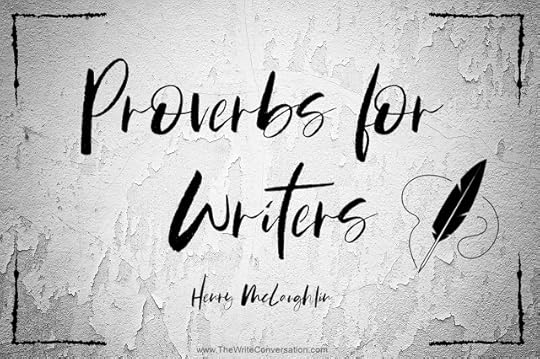
by Henry McLaughlin @RiverBendSagas
Here are some proverbs I believe apply to all of us, but especially those of us who are pursuing the dream of being writers.
Proverbs 3:12 (NLT) For the Lord corrects those he loves, just as a father corrects a child in whom he delights.
We are writing for the Lord in response to the call he has placed on us. Some of us do it enthusiastically. Some of us not so much. Perhaps we’ve become discouraged by the struggles of getting published. Remember, the Lord loves us and he delights in us when we do our best to answer his call. And he corrects us. Maybe we’re trying to write devotionals or inspirational books when he wants us to write fiction. He has a plan to use our fiction to inspire and guide our readers into closer relationships with him.
Maybe we believe we can’t write fiction. Then we trust in his correction and his guidance. He won’t call us to do something without equipping us to do it. It might be hard. You can almost count on it being hard. But he is doing it for our good and to build his kingdom. As Paul wrote, we are all part of the body of Christ and we each have our unique place. If we step out of that place, he will correct us because he loves us and he delights in us. After all, each of us is his favorite child. Proverbs 12:1 (NLT)
To learn, you must love discipline; it is stupid to hate correction.
It’s rare for the Bible to use the word “stupid.” Some translations use the word “foolish.” Is there really that much of a difference?
Hebrews 12:11 (NLT) tells us, “No discipline is enjoyable while it is happening—it’s painful! But afterward there will be a peaceful harvest of right living for those who are trained in this way.” Receiving and implementing discipline is hard. Often times, we have to give up behaviors and attitudes that are very dear to us. But they aren’t working. At least in our writing. So we need to learn new disciplines to become the writers God has called us to be.
I’ll leave you with these final thoughts in the form of proverbs:He who learns the craft through correction and discipline shall produce stories worth reading.A writer seeks counsel (discipline and correction) and feedback, for in these are strength and wisdom.A writer who walks in humility is wise and will grow in skill, in talent, and in ministry.
Be blessed as you continue your writing adventures in God.
TWEETABLE
Proverbs for Writers - encouragement from Henry McLaughlin, @RiverBendSagas on @EdieMelson (Click to Tweet)
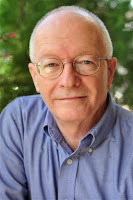 Henry’s debut novel, Journey to Riverbend, won the 2009 Operation First Novel contest.
Henry’s debut novel, Journey to Riverbend, won the 2009 Operation First Novel contest.Henry edits novels, leads critique groups, and teaches at conferences and workshops. He enjoys mentoring and coaching individual writers.
Connect with Henry on his blog, Twitter and Facebook.
Published on September 25, 2019 22:00
September 24, 2019
Passive Tense isn’t Good for Writing or Our Bodies

by DiAnn Mills @DiAnnMills
Writing is not a physically engaging activity. We sit in our chairs exercising our fingers over the keyboard while the rest of our bodies slip into passive mode.
While writers are concentrating on their manuscripts, they too often forget about taking care of themselves. When we choose high-sugar content snacks and beverages instead of good nutrition, our bodies suffer. The result is unhealthy bodies that suffer from stress, insomnia, and susceptibility to diseases. Energy is depleted. Unwanted pounds creep up. Over time, we can guess what that can do for the quality of our writing. The benefits of maintaining good health are always on the plus side.
Staying in shape physically and mentally isn’t just an exercise routine. We need to eat healthy too. The combination of sound nutrition and exercise lengthens our lives. We feel great. We relieve stress. And being more mentally alert means our writing is more polished.
Research tells us that when we don’t exercise our bodies, our bodies take a nosedive. Harvard Health states exercise charges the brain. When our brain receives an increase in blood flow, look out world. New brain cells spin into action. Imagine what that does to our manuscripts.
Experts claim aerobic exercise improves our brain functions, which means we learn more. We stay fit and are more able to fight off illnesses.
Experts also say resistance training helps our memories. It’s also a huge defense against weakening bones.
I start the day with exercise. Lifting weights and propping my laptop onto the treadmill is a win-win situation. In approximately five miles, I’m able to churn out my best writing of the day while keeping my body in shape. When we go to all that trouble, eating properly becomes a habit. Combine an exercise routine with eating nutritionally and we have another win-win situation.
In a recent article from Time Health Newsletter, the following statement confirmed my commitment to a daily walking routine. “…American Physiological Society’s researchers from New Mexico Highlands University found that when people walk, the pressure of making impact with the ground sends waves through the arteries, which increase blood flow to the brain (also called cerebral blood flow). Getting enough blood to the brain is important for healthy brain function, since blood flow brings the brain oxygen and nutrients.”
Some writers have physical challenges that limit movement. Here are two sites that offer solutions.1. 10 Chair Exercises for Seniors2. How to Exercise if You Have Limited Mobility
Your method of maintaining sound health may not be like mine, but the important factor is to weave diet and exercise for solid brain function that results in incredible writing.
How do you keep yourself and your writing at the top of your game?
TWEETABLESPassive Tense isn’t Good for Writing or Our Bodies - @DiAnnMills on @EdieMelson (Click to Tweet)
Thoughts to keep yourself and your #writing at the top of your game - @DiAnnMills on @EdieMelson (Click to Tweet)
 DiAnn Mills is a bestselling author who believes her readers should expect an adventure. She creates action-packed, suspense-filled novels to thrill readers. Her titles have appeared on the CBA and ECPA bestseller lists; won two Christy Awards; and been finalists for the RITA, Daphne Du Maurier, Inspirational Readers’ Choice, and Carol award contests.
DiAnn Mills is a bestselling author who believes her readers should expect an adventure. She creates action-packed, suspense-filled novels to thrill readers. Her titles have appeared on the CBA and ECPA bestseller lists; won two Christy Awards; and been finalists for the RITA, Daphne Du Maurier, Inspirational Readers’ Choice, and Carol award contests. She is the director of the Blue Ridge Mountain Christian Writers Conference, Mountainside Marketing Retreat, and Mountainside Novelist Retreat with social media specialist Edie Melson. Connect here: DiAnnMills.com
Published on September 24, 2019 22:00
September 23, 2019
Serious Writers Never Quit—A Book Review for Writers
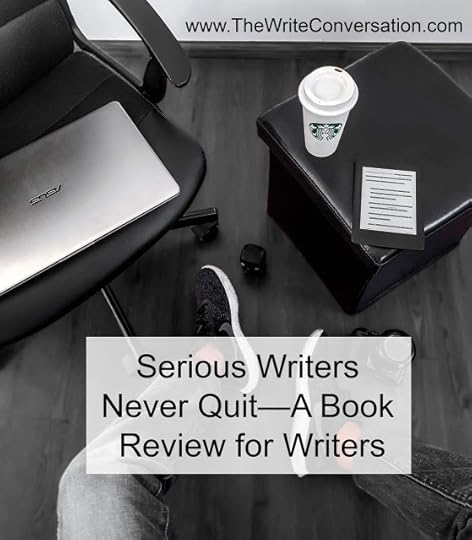
The past few weeks I've attended several writing conferences and as faculty we were asked—at every event—what books and resources do we find most valuable.
Although I've been asked this question before, it seems like it's becoming more and more common. As I pondered my answer, I also considered why so many are asking.
We live in a time of easy access—it's easy to publish a book, start a blog, offer a course, share a podcast. And it's easy to feel like we're drowning in this avalanche of publishing information. Beyond that, it's hard to tell what good advice and what's not.
Enter the question . . . and the answer.
Writes want someone they respect to help them sort through the information—and misinformation—and find what's worth spending time on.
There are several websites and blogs I recommend regularly—and I'll share them at the end of this post—but today I want to talk about the Positive Writer site. I've followed this site for several years and always get so much value from the information, encouragement and insight in the posts there.
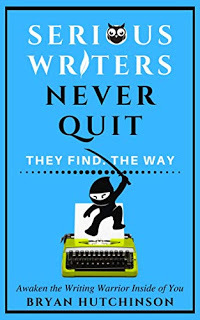 And now, Bryan Hutchinson has a new book for writers:
And now, Bryan Hutchinson has a new book for writers: Serious Writers Never Quit
This ebook is a quick read, but packed with valuable information. One of my favorite quotes comes early in the book, “It's not all skill. It's not all talent. It's not all luck. Ultimately, it’s what you tell yourself that makes you or breaks you as a writer, as an artist, and as a person.” Bryan Hutchinson
I love the encouragement in this book and the straight talk we all need to hear. There is a sprinkling of profanity, but I still whole-heartedly recommend it.
Now I promised to share the other sites I frequently recommend. This isn't an exhaustive list—but it is a list of some of my favs.
Steve Laube Agency Blog Books and Such Agency BlogWriters In the StormAuthor Kristen Lamb BlogProbloggerBlue Ridge Mountains Christian Writers Conference BlogNow it's your turn. I'd love to know what sites you'd add to your must-read-industry blogs. Be sure to leave your comments below.
TWEETABLESerious Writers Never Quit—A Book Review for Writers -@EdieMelson @ADDerWORLD (Click to Tweet)
Don't forget to join the conversation!Blessings, Edie
Published on September 23, 2019 22:00
September 22, 2019
Top 5 Tips For Surviving a Content Edit

by Ane Mulligan @AneMulligan
Some people hate editing, but I love this phase of writing. For me, that's where a good story becomes great. Where description becomes reader experience. When the pig gets lipstick.But when the book finally goes to the publisher, you get … The Content Edit. You may get a new editor, one who perhaps isn't familiar with you or your writing. It's easy for your defenses to go on alert, especially if you're multi-published. As your hackles rise, it's also easy to think you know more than the editor. Until they comment how much they love a description or comment "lol" over a sentence. Then they're brilliant. So here are a few tips to survive that process.
Tips for Surviving a Content Edit
5. After reading the content letter and reading through your editor's comments on the manuscript, let it sit for a day. Then go back and make the easy changes before you tackle the hard ones. When you see how much better your manuscript reads from the easier changes, it will make it easier to accept the harder ones.
4. When your editor asks for a brief description of a character so the reader can "see" him or her, do it. The funny thing is I'm a visual writer. I need pictures of my characters. But, I write tight. RUE (resist the urge to explain) and GWS (goes without saying) were the bywords of my early training. Reinforcing that, a writer I admire once said, "Readers like to put their vision onto the hero/heroine, so I don't give detailed descriptions of their looks." That doesn't mean drop all descriptions. Readers want to experience what the characters do. So when your editor asks for a glimpse at a character or the room, oblige her.
3. Content edits are hard. Your writing flows from one thought to another—one scene to the next. Then, your editor asks you to break up a scene and intersperse the information into other places. What? Yeah. And it's hard work. Kick a few cabinets if you need to. Then hike up your britches and do the work. I promise, in the end, you'll be glad you did.
2. We know all the thoughts inside the heads of our characters. The reader doesn't. If your editor asks for clarification, there's a good reason. Something stopped her, and we don't want the reader stopped. We may want to raise a question, but in a way that makes the reader keep going to find the answer. Your editor needs to know that, so together, you can find a compromise.
1. Your editor's goal is to make your book the best it can be. She knows fiction and how to make you look better. After all, her job is at stake. In the end, I accepted 99% of my editor's requested changes. The couple I didn't, she and I discussed. I explained my reasoning, and she agreed. What really stood out to me was that all the changes didn't affect my voice. And they truly made the book a better one, which was the goal. Yes, my editor definitely knows her stuff.
Look for In High Cotton, coming Summer of 2020.
TWEETABLESTop 5 Tips For Surviving a Content Edit - @AneMulligan on @EdieMelson (Click to Tweet)
It is possible to survive a content edit - tips from @AneMulligan on @EdieMelson (Click to Tweet)
 Ane Mulligan has been a voracious reader ever since her mom instilled within her a love of reading at age three, escaping into worlds otherwise unknown. But when Ane saw Mary Martin in PETER PAN, she was struck with a fever from which she never recovered—stage fever. She submerged herself in drama through high school and college. Years later, her two loves collided, and a bestselling, award-winning novelist emerged. She resides in Sugar Hill, GA, with her artist husband and a rascally Rottweiler. Find Ane on her website, Amazon Author page, Facebook, Twitter, Instagram, Pinterest and The Write Conversation.
Ane Mulligan has been a voracious reader ever since her mom instilled within her a love of reading at age three, escaping into worlds otherwise unknown. But when Ane saw Mary Martin in PETER PAN, she was struck with a fever from which she never recovered—stage fever. She submerged herself in drama through high school and college. Years later, her two loves collided, and a bestselling, award-winning novelist emerged. She resides in Sugar Hill, GA, with her artist husband and a rascally Rottweiler. Find Ane on her website, Amazon Author page, Facebook, Twitter, Instagram, Pinterest and The Write Conversation.
Published on September 22, 2019 22:00



